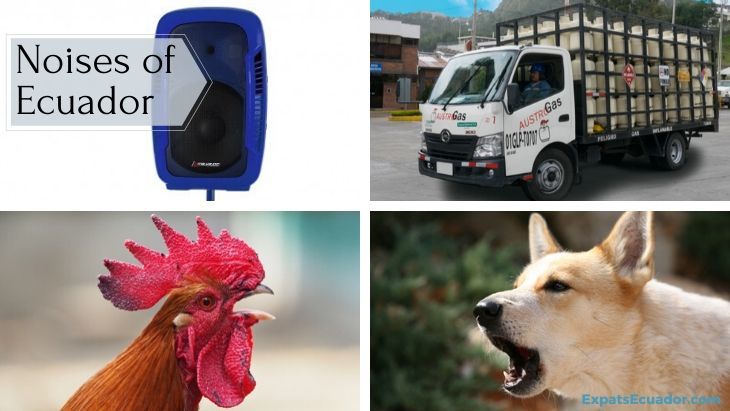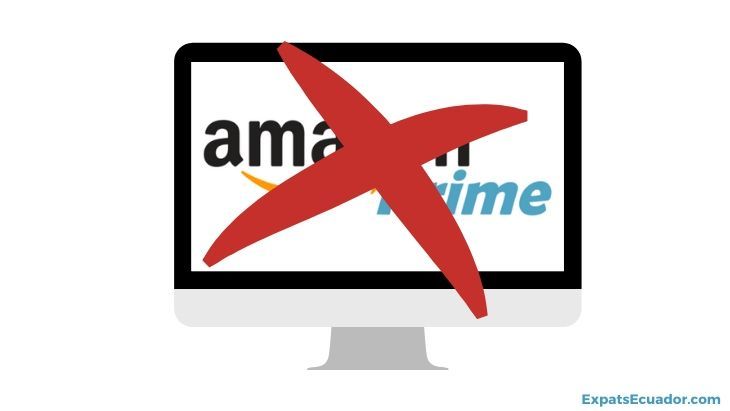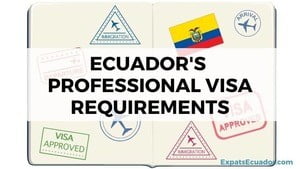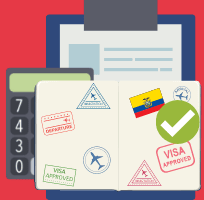We're getting to your messages. Thanks for your patience🙏
What do expats wish they knew before taking the plunge and moving to Ecuador? Turns out it's a lot.
Some of these things might be surface level, and in that case, you have a good shot of picking them up on an investigative trip to Ecuador before committing to the move. Which, I fully encourage you to do by the way.
But, others are not so easy to pick up and require a bit more digging until you're likely to come across them. So, visitors are not likely experience these on their investigative trip.
I've covered surface and non-surface issues below in my compilation of what I consider to be the 10 most important things that the luxury of hindsight has given myself and fellow expats living in Ecuador.
I think it's important for expats to have access to information that doesn't just paint Ecuador as a utopian expat destination. I also don't want you to read this and leave with an entirely negative view of Ecuador. I love it here and it has much to offer - despite some of the issues I dig into below.
Obviously the type of noise you may experience differs from city to city, neighborhood by neighborhood. ie Moving to the mountains of Cuenca will be very different to the coastal towns of Manta or Olon.
But, regardless of where you decide to live, there is a strong possibility that noise will affect you in some way. Some of the most common noise nuisances in Ecuador include:
We're talking about those big party speakers. These tend to me more of an issue around the weekend and fiestas, but they can be seriously out of control. If you're staying next door to bars or clubs, then it's to be expected.
What may be more surprising are the unofficial neighborhood parties that seem to last an entire weekend. Smaller towns and communities are not immune to this. We've been on several weekend escapes to the beaches or mountain towns where the persistent bass thumping has impacted our enjoyment.
Gas is delivered to homes via trucks throughout Ecuador. It's super cheap - $2 or $3 per tank. But, the delivery trucks blurt out a pretty horrendous song or horn to let everyone know they are in the area. Think of an ice-cream truck song, only one that may give you a headache.
One or two trucks per day may not be a big issue, but you may find that there is a lot of competition in your neighborhood, meaning you may have 5-10 trucks every day.
This can range from your more standard scenario where your neighbor has gone away for a few days and their dog is barking due to separation anxiety, to a choir of street and pet dogs singing all night. Either way, it can be pretty frustrating and lead to sleepless nights.
Most likely to be found in rural and beach communities, crowing roosters can be alarmingly common.
We aren't talking about a party atmosphere, just people having what appears to be an everyday conversation loud enough for the entire neighborhood to hear.

When moving countries, it's tempting to sell the family home and buy a property in Ecuador. It can be especially tempting when the price of property in Ecuador is cheaper than your native country, theoretically giving you instant access to a considerable upgrade.
But, there's many risks when purchasing property in Ecuador that you may not be able to easily safeguard against. We cover these risks in more detail in our guide to buying and renting in Ecuador.
Please don't buy property in Ecuador unless you've done your proper due diligence. This is especially so given the price of renting property in Ecuador is so low.
Rent for 6 months first. Then, when the rose colored glasses have dissipated, make an investment decision detached from the emotions associated with moving to a new country.
You will encounter street dogs in Ecuador. This can be a confronting experience for some. Seeing neglected dogs on a daily occurrence still pulls at my heartstrings. We've taken in a couple of dogs, but until there is a shift in the general population on the responsibilities of dog ownership, street dogs will remain.
By all means, support your local dog shelters and charities, but understand that Ecuador is a developing country with more pressing priorities.
There is a persisting cultural norm that punctuality doesn't matter. This is a pet-peeve of mine that no amount of meditation seems to absolve. Try not to take it personally if someone doesn't show up for an appointment on time, or at all. This covers both personal and business relationships.
Be prepared to harass your internet provider, bank, landlord, visa facilitator, maintenance workers etc. You will need to be proactive if you want stuff to get done.
There is no functioning public postal service in Ecuador. Meaning you'll be relying on expensive private services like DHL for sending internationally or Servientrega for domestic.
Dealing with customs for international deliveries is a crapshoot. There is a real risk of not receiving your goods, or needing to pay high import fees if you want to collect them. Weirdly enough, navigating Ecuador's customs system was the reason I ended up in Ecuador.
Yes, laws differ from nation to nation. But, you may not be prepared for how the rule of law is applied in Ecuador compared to your native country.
Navigating residential property leases, property contracts and service contracts (ie getting locked into an internet plan) are difficult for Ecuadorians and significantly harder for expats with limited Spanish.
Laws relating to starting and running a business are unnecessarily cumbersome (try to legally fire an Ecuadorian), which hampers innovation and makes it less appealing for expats to run local businesses.
I consider Ecuador to be a safe country, but one area of law which scares me is the road rules. Particularly in the case of an accident where there is a policy of holding all drivers in jail until fault is determined. This can be days.
I've purchased a dashboard cam for this very reason as I want to be able to prove my innocence if need be.
Getting an Ecuadorian driver's licence is a commitment. You won't be able to easily transfer your existing licence without having a bunch of forms from your native country apostilled. The other option is to have lessons which can take a few weeks to complete.
Buying a car is more expensive in Ecuador that you'd first think. The taxes are high, which turns a car you'd buy in the US for $10K into an $18K - $20K investment. However, running a car is cheap with low gasoline prices and labor costs.
Many expats are retirees living off social security, so employment isn't a concern for them. For those that need to earn an income, finding adequate local employment can be very difficult.
The minimum wage is currently $400 per month. This is the legal minimum, not to be confused with the average wage. Finding employment that provides incentives greater than $2K per month is hard, for locals and expats alike.
The cost of living in Ecuador is generally low, so you don't need to earn the same as you would in your native country to live a comfortable life.
Expats generally have a significant language barrier they need to overcome too. If you don't speak Spanish fluently, your odds of finding a decent job are slim.
There is a lot of competition, especially for unskilled jobs. If you don't have a skill that's in high demand or run your own business, it can be difficult to earn a liveable income.
The most common local jobs seem to be for English teachers or in tourism, but the pay can be very low. Many expats find that online or remote work provides the best effort vs reward. The most common roles are:
Don't expect Amazon Prime-like conveniences. Online ecommerce is still in its infancy and the tech scene is yet to mature. Whilst fruit and vegetables are cheap, processed foods from the supermarket will cost more than you'd expect.
You simply won't have the easy access to consumer goods you're accustomed to. For many, this means filling suitcases with any nice-to-haves when holidaying in their native country or having friends and family visiting Ecuador doing the same. In particular, we recommend bringing electronics into Ecuador.

There's a variety of different taxes in Ecuador that are worth understanding.
High import taxes hike up the prices of everything not produced in Ecuador. This is all pervasive and covers supermarket imports like your favorite cheese to cars.
It's a good idea to complete a budget during an investigative trip that covers all your expected day-to-day expenses and compare this with what you currently pay.
Transferring money into Ecuador can be cheap and easy. But transferring cash out of Ecuador will invoke a 5% exit tax on any amount greater than 3 x the current basic salary ( as of 2020 it's 3 x $400 = $1,200).
You'll need to pay the 5% tax whether it's transferred via a bank or carrying cash out through the airport. If you are caught lying at the airport, you'll forfeit much more than the 5%.
This unofficial tax exists because of the general perception that gringos have money. It may rear its head in many day-to-day circumstances such as taxis and local markets, to much more substantial purchases such as buying and renting property.
Even if you take the 'gringo' part out of the equation, the fact that you haven't learned to negotiate the same way as locals do puts you at a considerable disadvantage.
This is a key reason why Michelle leads all of our negotiations around leasing or purchasing anything substantial. Michelle can simply get a much better deal than I can.
If you're looking to rent, it can be a good idea to have a trusted local from whatever town you're considering living in to help find and negotiate the price for you.
I hope this list sparked some topics for you to research further. There's a lot to take in when considering your move to Ecuador - this list is just the tip of the iceberg.
Feel free to let me know if there's a topic we've missed out or not covered in enough detail.





A noise ordinance for after 10pm should be implemented in the cities. It's bullcrap to have people partying all night when you need to sleep.